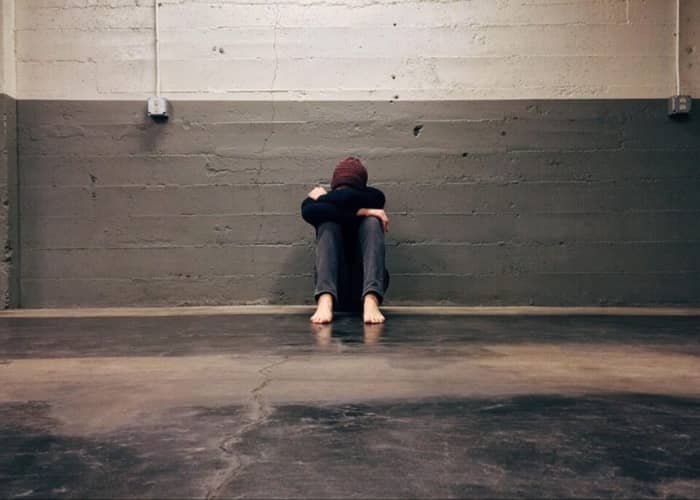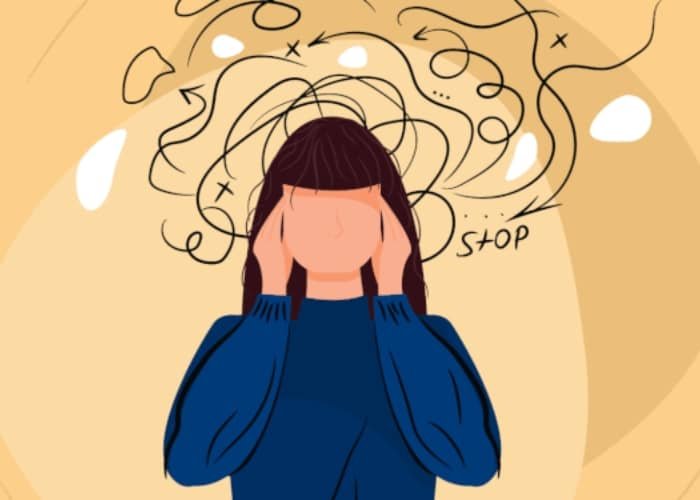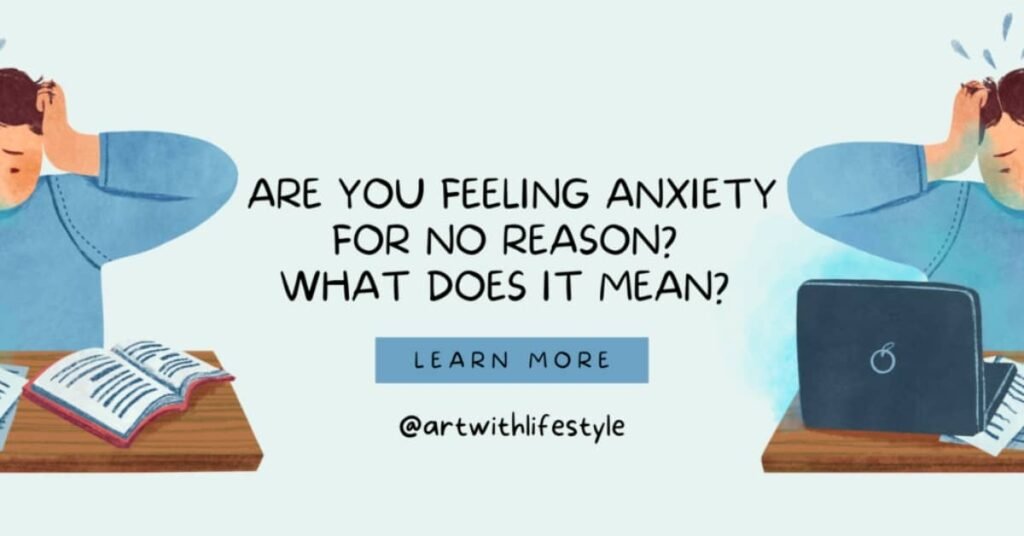Are you feeling anxiety for no reason and want to know how to point it out? We’re going to help you with that.
Are you feeling Anxiety for no reason?

An estimated population of 4% suffers from anxiety disorders like PTSD, OCD, Schizophrenia, and more. This is an astonishing number of people having anxiety disorders worldwide (which goes above millions).
And about 6 million adults have panic attacks among the U.S. population as per 2020 data.
Also, females, teens, and adults in their early 20’s are most likely to develop anxiety issues. This doesn’t mean that other people don’t suffer from it.
Many people suffer from anxiety that is dreadful or interferes in their daily life. Yet they may think that their feeling of anxiety is for no reason and would eventually go off on its own. This is not exactly the reality.
What is Generalized Anxiety Disorder?

Generalized Anxiety Disorder (GAD) is a psychological disorder in which the person feels frequent if not, anxiety attacks that might be avoided if somebody, in general, faced it. GAD is direct to the condition where you start feeling anxiety for no reason.
If you haven’t heard of this before, then below are the symptoms to help you understand better.
Symptoms of GAD include:
- Difficulty with sleep (having too much or too less)
- Hunger problems
- Worrying constantly
- Random headaches or stomach ache (sometimes body ache)
- Nausea
- Heart palpitations
- Dizziness or blacking out
- Restlessness or irritation
- Muscular tension
- Concentration problems
While these symptoms indicate GAD related condition, it should never mean that you can diagnose yourself according to this. For proper diagnosis, it is better that you seek the help of a specialist since they can guide you right.
You must be wondering now ‘what is the reason or reasons that lead up to Generalized Anxiety Disorder?’. They can be:
- A pattern of negative thoughts spiral
- Past trauma memory
- Genetic history
- Side effects of anxiety medications
- Overuse of, or addiction to alcohol and drugs
That’s right. Anxiety can run in genes too. For instance, if anyone in your family has had anxiety issues, it is likely to appear in you. Even so, there is nothing to worry about. Not every anxiety is for your harm. Plus, your genes cannot always define the way you handle your emotions.
Some Anxiety can be to your benefit

When we get anxious, our brain gets alert and sends signals to the adrenal glands (located on both kidneys), which release stress hormones: Cortisol, Adrenaline, and Noradrenaline.
In ancient times, humans could sense the danger and choose any one option: fight, flight, or freeze. These were our brain indicators to let us know what action should we take. These indicators stayed with the course of evolution and now we still choose from one of these whenever an unusual situation occurs.
The hormones mentioned above do this to our brain and we are left with no other choice but to either fight, flight, or freeze.
The chemical changes that take place inside our body are:
- Increased heart rate and blood flow
- Increased cognitive function (like concentration)
- Awake mind
- Higher metabolic rate
- Quicker reaction span
These changes are actually useful for you. Suppose you have a test tomorrow, it is midnight right now and you know about nothing from the syllabus. What to do?
You start getting anxious and a rush goes through your whole body. You are now fully awake, decide to pull out your books and try studying or reaching out to your friends for help for the test.
If it wasn’t for that anxiety, you wouldn’t have done a single effort for it and might have fallen asleep carelessly.
Most things in our life act the same way. If used correctly and adequately, they give positive outcomes. But if it gets excessive, you start seeing toxic results.
You can also take reference from the article- “Is Anxiety a mental illness?” to learn about managing anxiety to some extent.
What Is Free-Floating Anxiety or Anxiety For No Reason?
Free-floating anxiety is the hallmark of Generalized Anxiety Disorder among other symptoms. What is it?
In simple language: ‘It’s an exaggerated response to a situation that’s rather non-threatening in reality or just anxiety for no reason.
People with GAD often find encounters with stressful situations very triggering. Sometimes, triggers are not even there but the anxiety shoots up.
If you randomly start getting anxious without any reason and that anxiety doesn’t go down with time, that’s a sign you should see an expert immediately. They can help you acknowledge your state and tell practical ways of managing it.
How To Manage Free-Floating Anxiety?

If you feel like you keep getting free-floating anxiety that ruins your productivity then seeking a specialist is the best option. Nevertheless, here are some tips for you to do some self-work and learn how to manage it:
a. Talk about it
Talking about your persistent and random shots of anxiety with someone you trust, can help you understand yourself better. It is ironic in some way that we understand ourselves more from the reflection of other people’s words. But this works effectively, instead of bottling it up and blaming yourself for everything. You deserve to be seen so, feel no embarrassment in opening up.
b. Do journaling
Not in a habit of writing? That is totally okay! Start with writing at least one sentence that describes the mood of your whole day. Recording and keeping track of your moods assists well in learning about your anxiety.
c. Accept it
Today or one day, you’ll need to stop beating yourself up for the things that happen to you. Anxiety is a part of being human and a type of conditional reflex. If it wasn’t for this, you wouldn’t have known if something is favourable for you. Though the free-floating anxiety can make the situation worse, you can still believe that the anxiety will go away (like it normally does). It could help you observe, learn, and improvise your thought patterns.
d. Do not voluntarily avoid the anxiety
This is one of the paradoxes of our subconscious mind. Your therapist would tell you to do the same. There is a reason behind this.
Why do rehabs don’t mostly work or why running from problems gives you more problems?
That’s because what we actively avoid gets registered in our minds as something important. Our brains can’t figure out between the good and the bad that easily. Therefore, we can’t stop thinking about it. Then we fall into it more. And the loop continues. Similarly, if you keep worrying about your anxiety, you get more anxious, which gives you more anxiety.
So you can just let it be as long as it is manageable.
Treatment or Aid For Anxiety Without Reason

The best treatment is to see a doctor in practice whether you’re unable to figure things out or you can’t handle things.
Therapy is for everyone regardless of their condition.
Guess how many people receive treatment in spite of the seriousness? That is a mere percentage of 41-43%. It is probable to think that most people either refuse to understand their situation or can’t receive proper treatment at all.
If given the proper treatment, why would they refuse to receive it? It’s because of the stigma around it being for only mentally-ill people.
Proper treatment may involve talking therapy, medications, or both. It is okay to take medications if your therapist tells you because they are recording your health better than anyone at that point.
In case of emergency, you can contact helpline numbers: 911 (U.S. helpline) and 999 (for Indian medical emergency). They don’t ask for your name or too many details.
Even if your anxiety is for no reason, there is no harm in reaching out for help. It doesn’t matter how things turn out, there will always be a silver lining for you. Stay safe. Stay healthy.
To reduce the possibility of getting one, make sure to check the symptoms beforehand and work on controlling them.
Conclusion
Feeling anxiety for no reason can be a challenging and distressing experience. However, it is a common issue that can be managed with the help of a mental health professional. Seeking support and treatment can lead to a reduction in symptoms and improvement in overall well-being. Remember, it’s important to take care of your mental health and address symptoms of anxiety for a healthier and happier life.
Check Out Our more Article on Health and Fitness.
FAQS
Ans. Anxiety can be due to several reasons. Mostly, it goes away with time. But when it stays longer and tries to interfere in your work and life, then you need treatment for it. In this case, the best suggestion is to see a therapist who can help you with your situation.
Ans. A quick way to do this is by gaining focus on your breathing by taking deep, long breaths in and letting them out slowly. Also, you can look around yourself and name 5 things you can see, 4 things you can touch, 3 things you can hear, 2 things you can smell, and 1 thing that you can taste.
Ans. According to researchers, anxiety attacks can last anywhere between 20 to 30 minutes. Now, this can vary from person to person. Frequently, the anxiety level is at its apex in the middle of the attack. The duration of minutes can feel like hours of misery for the person undergoing it.



